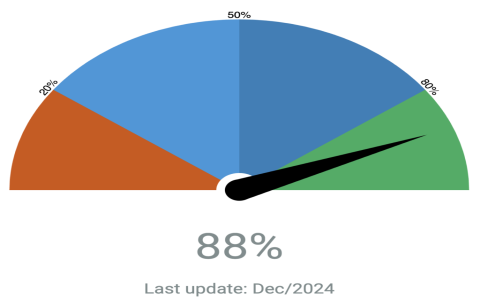In the dim glow of a loft-turned-laboratory above the old printworks of East London, a man they call Mister Predictor is already awake. His real name—Dr. Elias Moreau—appears only on dormant academic papers; the city knows him by the moniker whispered across trading floors, newsrooms, and late-night podcasts. Mister Predictor does not guess the future; he negotiates with it, line of code by line of code, until probability folds into something resembling certainty.
The ritual begins at 4:07 a.m., when freight trains rattle the bricks and the Thames smells of rust and salt. Moreau pours single-estate Ethiopian beans into a hand-built burr grinder, timing the crush to the exact cadence of the approaching train. Sound, he discovered long ago, is data: frequency, amplitude, decay. The grinder’s pitch becomes a variable in his first model of the day, forecasting micro-spikes in robusta futures before the cargo even reaches port. By the time the espresso crema settles, a cloud dashboard blooms green: an 81 % likelihood that a drought index will trigger export quotas by noon. He shorts the market quietly, anonymously, through shell entities named after extinct butterflies.
Outsiders imagine a throne of monitors streaming neon hieroglyphs, but Moreau’s workspace is almost monastic. One curved screen, one mechanical keyboard whose switches click like hail on slate, and a wall of chalkboards tattooed with equations that half the physicists at King’s College cannot parse. The only decoration is a Victorian barograph, its brass recording arm forever etching the weight of air. He insists it keeps him humble: “Weather was the first conspiracy between earth and sky,” he says. “Everything else is just commentary.”
Mister Predictor’s origin story is already folklore. A decade ago, as a post-doc in computational linguistics, he fed 400 years of parish registries, grain prices, and witch-trial transcripts into a sentiment engine to see if fear predicted harvest failure. The model outperformed every agricultural economist in the UK. A hedge fund offered him seven figures and a silence agreement; he took the money, vanished from scholarly citation, and resurfaced two years later having re-engineered himself into an urban legend. Now corporations, governments, and desperate individuals wire him retainers in cryptocurrencies whose wallets self-destruct after single use. Nobody possesses his phone number; requests arrive as steganographs buried in cat memes on obscure message boards. He answers only when the puzzle amuses him.
Yet the future is a spiteful collaborator. Last spring an algorithm he christened ORPHEUS forecast a 94 % probability that a minor politician would trigger a constitutional crisis by September. The number felt triumphant, almost cruel in its clarity. Then the politician died in a climbing accident in July, and the crisis never materialized. The model had assigned fatality a mere 0.3 %. Moreau spent three weeks in Iceland, walking lava fields where the ground itself is younger than his skill set. He returned with a single correction baked into every subsequent run: “Include the volatility of chance within the model’s self-regard.” Translation: even certainty must doubt itself 6 % of the time.

Tonight’s commission arrives encoded in a fourteen-second TikTok of a dancing cockatoo. Frame-by-frame hue saturation reveals a hexadecimal string that unpacks into a plea from a Lagos start-up whose drone-delivery network is haemorrhaging cash. They need to know if a military coup is probable before the next funding round. Moreau feeds the request into ORPHEUS-9, a lattice of 2.7 million nodes that ingests everything from night-time satellite radiance to the tonal curve of the president’s latest speech. While the GPUs hum, he cooks shakshuka, timing the poached eggs to the moment turbulence crosses the Coup-Index threshold. The fork pierces yolk at precisely 03:2l GMT; the screen flashes amber: 64 %. Too high for investors, too low for insurance. He dispatches a single sentence to Lagos: “Pivot to medical supplies; coups hesitate at hospital gates.” No explanation, no signature. His fee—one bitcoin—arrives within minutes.
There are side effects to trafficking in futurity. Moreau experiences time as a palimpsest: every supermarket queue is also the queue from next month, next year. He once stepped off the Tube at Covent Garden and saw the station both intact and cratered, timelines flickering like faulty fluorescents. The condition is not debilitating; it is simply the interest due on borrowing tomorrow’s knowledge today. He mitigates it with strict sensory rituals: the scent of cardamom in the grinder, the drag of chalk against slate, the low C emitted by the barograph when pressure plummets. Anchor points. Predictive buoys in a swelling ocean.
Some nights he wonders what would happen if he turned the lens inward. ORPHEUS could chart the probability of his own heart attack, the date loneliness crystallizes into something terminal, the chances that one day he miscalculates and the world decides it no longer needs a Mister Predictor. So far he has resisted, fearful that foresight might feel like predestination, fearful of discovering the exact moment when curiosity finally exhausts itself. Instead he keeps to small, recursive forecasts: the precise minute the espresso machine will scale, the likelihood that the barograph’s brass arm will snap under the weight of an approaching storm. He finds comfort in these minor certainties, proof that the machinery still loves him.
Dawn finds him on the roof, coat collar turned against the wind that carries the city’s amalgam of diesel and river rot. Somewhere below, traders will soon caffeinate and clash over numbers he seeded hours ago. Somewhere far away, a Nigerian engineer re-programs delivery routes to skirt barracks that may or may not empty onto the streets. Moreau inhales, tastes the metallic edge of coming rain, and opens a blank notebook. At the top of the page he writes a single sentence, neither prophecy nor memoir: “The future is a shy animal; track it softly or not at all.” Then he descends the narrow stairs, pockets the notebook, and waits for the next coded message disguised as ordinary chaos, ready to negotiate once more with the minutes that have not yet dared to arrive.















